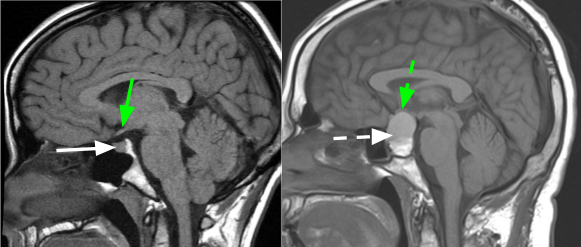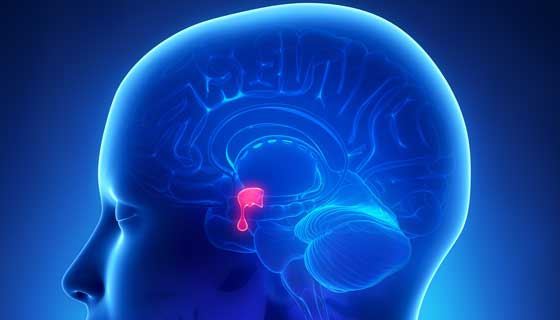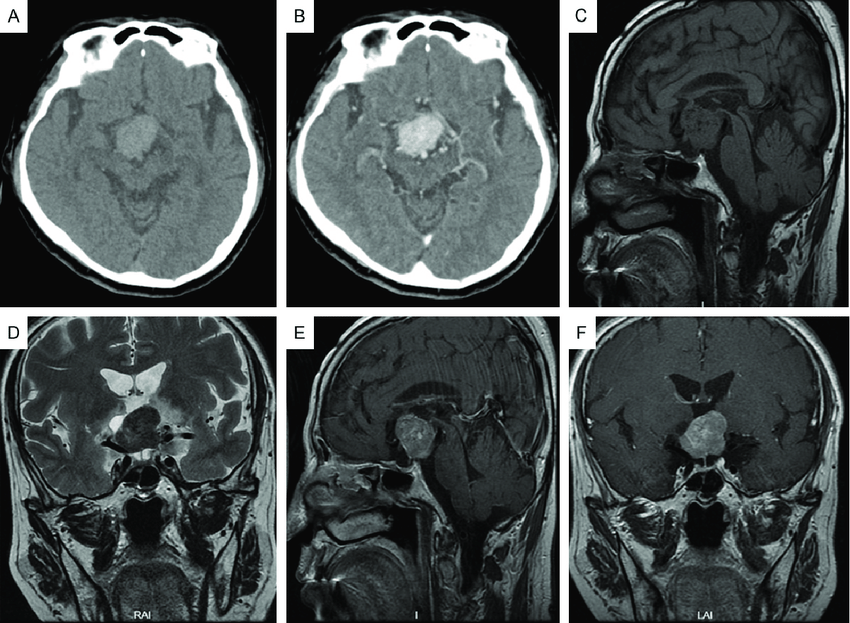The pituitary gland is a small, bean-shaped endocrine gland that sits at the base of the brain. It is responsible for several important functions, including the regulation of growth and development in children, and several hormones that affect metabolism and sexual function.
The pituitary gland produces many different hormones, some of which are secreted directly into the bloodstream while others are stored in cells called neurosecretory cells, or neuroendocrine cells. These neuroendocrine cells release their hormones when they receive signals from other parts of the brain or from other glands in the body.
In addition to its role as an endocrine gland, the pituitary produces hormones that stimulate other glands in the body to produce their own hormones. Some of these hormones include adrenocorticotropic hormone (ACTH), prolactin, thyroid-stimulating hormone (TSH), luteinizing hormone (LH) and follicle-stimulating hormone (FSH).
The pituitary gland is a small endocrine gland located at the base of the brain. This tiny organ secretes hormones that help regulate many important body functions, including growth and development, metabolism, reproduction, and stress response.
The pituitary gland is composed of two lobes: the anterior lobe and posterior lobe. The pituitary gland also has two distinct regions: the pars distalis (anterior lobe) and the pars intermedia (posterior lobe).
The pituitary gland is very important in regulating hormone levels in the body. It produces many different hormones that are secreted directly into the bloodstream, where they travel throughout your body. For example, one hormone produced by your pituitary gland is called gonadotropin-releasing hormone (GnRH). GnRH stimulates other endocrine glands to produce hormones such as FSH and LH that control reproduction in both men and women.
In addition to its role in reproduction, the pituitary gland also releases growth hormone (GH) — a protein responsible for stimulating cell growth — which helps children grow taller during puberty. GH release peaks during adolescence then declines significantly after age 30 years old.
What causes enlargement of the pituitary gland?
The pituitary gland is a small organ located below the brain. It produces hormones that control many of the body’s functions, including growth. The exact cause of pituitary gland enlargement is unknown, but it can be caused by tumors, cysts and other abnormalities.
Tumors are one of the most common causes of pituitary gland enlargement, according to the National Institute of Neurological Disorders and Stroke (NINDS). These tumors are usually noncancerous growths called adenomas or adenomatous hyperplasia. They may also result from exposure to radiation or certain chemicals.
Another common cause of pituitary gland enlargement is Cushing’s disease, which occurs when your body produces too much cortisol, a hormone released by the adrenal glands near your kidneys. This causes fluid retention in your body and increases pressure in your skull cavity. Cushing’s disease is often caused by an adrenal tumor on top of the kidney called an adrenal adenoma or adenocarcinoma.
Other causes include noncancerous brain tumors such as craniopharyngiomas (growths that form on the pituitary gland) and hemochromatosis (an inherited disorder characterized by excess
Pituitary gland enlargement, also known as macroadenoma, can cause a variety of symptoms. The most common symptom is headache. It may be caused by the increased pressure on surrounding tissues and nerves. Other symptoms include double vision and changes in your sense of smell or taste.
Causes of Pituitary Gland Enlargement
Pituitary gland enlargement can be caused by one or more of the following conditions:
A tumor in the pituitary gland (pituitary adenoma). This type of tumor is usually benign but can be malignant.
A tumor in another part of the brain that presses on the pituitary gland (suprasellar mass) or surgery to remove that tumor
Too much growth hormone, which causes overgrowth of bones and soft tissue (acromegaly)
Too much prolactin, which causes breast enlargement in women and impotence in men
The pituitary gland is a small endocrine gland located at the base of the brain. It produces hormones that regulate many important processes in your body, including growth and reproduction.
Pituitary tumors are rare in children and young adults, but they’re more common in older adults.
The most common type of pituitary tumor is called a prolactinoma. This type of tumor makes too much prolactin — a hormone that stimulates breast milk production during pregnancy (lactation). A prolactinoma usually grows slowly over time (over months or years), causing symptoms such as headaches, vision loss and problems with balance.
Other types of pituitary tumors include:
Craniopharyngiomas — slow-growing tumors that start in the cells that produce hormones made by the hypothalamus (another part of your brain). They usually appear before age 20 and cause symptoms such as headaches, vision loss and problems with balance. Craniopharyngiomas can grow large enough to compress nearby parts of the brain and cause serious complications if they aren’t treated promptly.
Does the pituitary gland enhance?

The pituitary gland is a small endocrine gland that sits at the base of the brain. It is responsible for producing many hormones, which are chemicals that help regulate the body’s functions.
The main function of the pituitary gland is to produce and secrete a variety of hormones that affect growth, development, metabolism and sexual function.
The pituitary gland also releases many hormones that regulate or control other glands in your body. For example, it produces growth hormone — a hormone that helps children grow taller and adults maintain lean muscle mass. It also produces thyroid-stimulating hormone (TSH), which controls how much thyroid hormone is released by your thyroid gland.
The pituitary gland is a small endocrine gland located at the base of the brain, behind the nose. The pituitary gland secretes hormones that control the growth and development of the body. It also produces hormones that control other glands in the body.
The pituitary gland has two lobes, which are connected by a thin bridge of tissue called the infundibulum. The anterior lobe secretes six different hormones (including growth hormone), while the posterior lobe secretes two hormones: oxytocin and antidiuretic hormone (ADH).
An enlarged pituitary gland may be due to one of many causes including:
Cushing’s syndrome, which causes adrenal hyperplasia (overproduction of adrenal hormones) and often affects both adrenal glands as well as the pituitary gland
Other conditions that cause excess corticosteroid production such as sarcoidosis or tuberculosis
Tumors that produce excess growth hormone or prolactin (lactation)
Tumors that produce excess ACTH (adrenocorticotropic hormone)
The pituitary gland is a small gland that sits at the base of the brain. It produces hormones that control the function of other endocrine glands in the body.
The pituitary gland is controlled by another part of the brain called the hypothalamus. The hypothalamus releases hormones that stimulate or inhibit the secretion of hormones from the pituitary gland.
Pituitary adenoma
A pituitary adenoma is a noncancerous (benign) tumor that can develop on one or both sides of your pituitary gland. These tumors can cause many different symptoms, including headaches, vision changes and trouble swallowing or breathing.
The pituitary gland is a small endocrine gland that sits like a pine cone at the base of your brain.
The pituitary gland is composed of two lobes: the anterior lobe and the posterior lobe. The anterior lobe secretes hormones that control growth, metabolism and sexual maturation. The posterior lobe produces hormones that control other body processes, including stress responses and fluid balance.
Pituitary Gland Function
The pituitary gland has three functions:
1) To secrete hormones which help control growth, metabolism, sexual maturation, water balance and stress reactions. These include:
Growth hormone (GH) promotes growth of muscle and bone. It also helps regulate blood sugar levels, which is why it’s sometimes used to treat diabetes in children. A deficiency in GH can cause short stature (dwarfism). Normal GH production starts around puberty; before then it may be low or absent. GH deficiency can occur with aging as well as with some cancers, AIDS and other conditions.
Thyroid-stimulating hormone (TSH) stimulates production of thyroid hormones by the thyroid gland (see below). TSH levels are usually checked as part of routine blood tests to look for thyroid disease such as hyperthyroidism or
How do you know if a pituitary tumor is cancerous?
The diagnosis of a pituitary tumor is made by a doctor. In some cases, an imaging test (such as an MRI or CT scan) may be performed. A biopsy may be needed to confirm the diagnosis. In general, doctors look for 2 specific features in order to determine whether or not the tumor is cancerous:
Cell type: The type of cells in the tumor can help indicate whether or not it’s cancerous. Normal pituitary tissue has no cells (or very few) that look like cancer cells under the microscope; however, if there are many cells that resemble cancer cells in your biopsy sample then your doctor should consider it malignant.
Vascular invasion: Cancer cells can invade blood vessels and lymph vessels (the vessels that carry fluid to and from organs). When this happens, it usually means that the tumor is more aggressive and likely to grow into surrounding brain tissue quickly once treatment begins.
A pituitary tumor can be a benign (noncancerous) or malignant (cancerous) growth. The majority of pituitary tumors are benign, but about 10% of all pituitary tumors are malignant. In general, a small tumor that does not cause symptoms is unlikely to be cancerous.
In some cases, however, a benign pituitary tumor may grow large enough to press against the optic chiasm and interfere with normal vision. A large tumor can also cause other symptoms such as headaches, vision changes, memory loss, and endocrine problems like diabetes or hypothyroidism.
If you have any symptoms that suggest you might have a pituitary tumor, it’s important to see your doctor right away. Your doctor will examine you, ask questions about your medical history and any recent symptoms, and give you an eye exam as well as blood tests to check for certain hormones in your body that are produced by the pituitary gland.
Should I worry about an enlarged pituitary gland?

The pituitary gland is the size and shape of a pea. It’s located at the base of the brain, just below and between your eyes.
The pituitary gland produces several important hormones. These hormones help control growth and development, blood pressure, sexual function, energy levels and other key parts of day-to-day life.
Occasionally, the pituitary gland becomes enlarged — a condition called acromegaly or gigantism. Acromegaly occurs when a tumor on the outside of the gland (called an adenoma) causes it to produce too many growth hormones. Gigantism occurs when a tumor inside the pituitary causes it to produce too many growth factors (or genetic changes).
If you have an enlarged pituitary gland, your doctor may order imaging tests such as MRI or CT scans to see if you have any tumors within your brain or pituitary gland itself. If there are tumors present in these areas, they may be removed surgically or treated with medication or radiation therapy.
It’s not common for the pituitary gland to become enlarged. In most cases, this problem is caused by something else, such as a tumor or infection.
If you develop headaches and double vision, you should see your doctor right away. These symptoms can be signs of an overactive pituitary gland (a condition called acromegaly).
An enlarged pituitary gland can lead to other problems as well. For example, it can cause high blood pressure (hypertension). It also may cause low blood sugar (hypoglycemia) if you take too much of insulin or certain medications for diabetes.
What is the treatment for an enlarged pituitary gland?
The treatment for an enlarged pituitary gland depends on the cause of the condition.
In some cases, the doctor may recommend surgery to remove the entire pituitary gland. This is called a transsphenoidal hypophysectomy. This type of surgery is often done using a microscope and camera placed through the nose and sphenoid sinus. It requires general anesthesia and is performed in an operating room.
If your doctor recommends surgery, you’ll be given instructions about what to do before and after your procedure.
If you have acromegaly or Cushing’s disease, treatment will depend on how severe your condition is. For example:
Treatment for Cushing’s disease usually involves taking medication to inhibit production of cortisol by the adrenal glands. Medications used include prednisone (a corticosteroid) or metyrapone (a synthetic form of an enzyme that blocks production of cortisol).
Treatment for acromegaly involves taking medication to block growth hormone production by either surgery or radiation therapy directed against growth hormone-producing cells in the pituitary gland
The treatment of an enlarged pituitary gland depends on the cause of the growth.
If the cause is due to a tumor, then surgery may be required to remove it. A neurosurgeon can remove an abnormal portion of the pituitary gland and make sure that no cancer cells are present. The entire pituitary gland can also be removed, but this is generally reserved for cases in which cancer has spread throughout the gland.
If your doctor suspects that you have an enlargement due to an excess of ACTH or other hormones, then he or she may recommend medication that suppresses these hormones. This medication is usually taken daily for several months until symptoms improve and the size of your pituitary gland decreases.
In some cases, doctors prescribe medications such as steroids (such as prednisone), which help reduce inflammation and swelling in your throat and nasal passages. If you have nasal congestion due to allergies (asthma) or other causes, your doctor may recommend medications such as antihistamines or decongestants to help control symptoms
What are the side effects of an enlarged pituitary gland?

Pituitary tumors are rare, but they can cause problems if they press on nearby structures. The most common pituitary tumor is a prolactinoma, which causes hyperprolactinemia (high levels of prolactin in the blood). Hyperprolactinemia causes many of the same symptoms as an enlarged pituitary gland:
Milk production in women who don’t breastfeed, or lactation in men or women who don’t have children
Headaches
Tiredness and fatigue
Changes in vision or blurry vision
High blood pressure (hypertension)
What are the side effects of an enlarged pituitary gland?
The most common symptoms of an enlarged pituitary gland are headaches, double vision, and problems with balance. Other symptoms include:
Headaches. Some people with an enlarged pituitary gland experience headaches as a result of pressure on their optic nerve. The headaches may be mild or severe and may be accompanied by nausea and vomiting.
Double vision (diplopia). Double vision occurs when the eyes don’t move together properly because there is something wrong with one or both muscles that control eye movement. Double vision may be caused by an enlarged pituitary gland if the cause is related to a tumor in the sella turcica compressing one or more nerves that control eye movement (abducens nerve).
Problems with balance (vestibular dysfunction). An enlarged pituitary gland can cause problems with balance as a result of pressure on the vestibular system (inner ear), which controls balance. People who have had surgery for an enlarged pituitary gland may have difficulty walking or standing still after surgery because of this problem. They often feel unsteady when they start moving again after sitting still for a while, such as after surgery.
